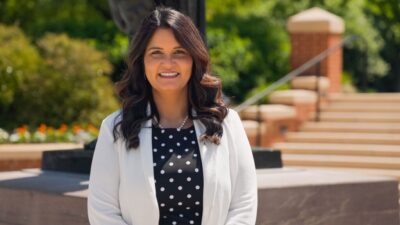Professor Vandana Singh Selected for Prestigious 3C Fellowship Program

Dr. Vandana Singh, professor in the School of Information Sciences and director of diversity, equity, and inclusion for the College of Communication and Information, was recently selected for the Cultural Competence in Computing (3C) Fellowship program.
The cohort-based program is for faculty, staff, graduate students, and others in the computing field who want to engage in professional development on the topics of DEI and how systemic racism and bias impact students and faculty alike. Singh has been accepted into the program’s third cohort.
“The program is two years long, and the commitment is to produce a deliverable, which is either a course, workshop, webinar, or event emphasizing diversity and diverse perspectives in computing education,” Singh said.
Fellows are selected through a competitive international process, where they are carefully screened for existing biases. The program seeks candidates who have the capability to “stretch their learning,” as Singh puts it. The first year of the program focuses more on asynchronous reading and workshops. The second year will involve synchronous learning and collaboration with their cohort, culminating in the final concrete deliverables.
“This program is very unique. Cultural competence in computing is not something that is mainstream,” Singh said. “It’s innovative, and there isn’t anything like it globally.”
In Fall 2022, Singh offered a new course titled “Diversity, Equity, and Inclusion for Technology/Information Professionals (DEI-TIP).” She previously won the Google Award for Inclusion Research 2021 for developing the course. The C3 Fellowship Program is complementary to her ongoing work in DEI.
“I applied for this fellowship because I wanted to learn more tools and get ideas about how to best serve students who feel isolated in computing disciplines,” Singh said. “Often, these traditionally marginalized students do not encounter instructors who look like them, and that makes the experience even more difficult.”
In the field of computing, Singh remarked that there are often biases inherent to software and systems. She gave one example of how Zoom backgrounds tend to distort the videos of people of color more often than videos of white individuals.
“It’s extremely critical for not just people of color but for everybody to understand that there are biases that are built into systems they perpetuate inequity,” Singh said. “Irrespective of the fact that it might be conscious or unconscious, the harm is real, and the damage is real.”
While Singh encourages everyone to engage with this meaningful work, she is quick to note that an understanding of DEI topics cannot be acquired overnight and requires dedicated and at times uncomfortable study.
“I think anyone who wants to engage in this space genuinely has to start with the disposition of learning. You cannot come in as, ‘well, I know I’ve taught 20 years, so I know this.’ I think you have to start from scratch, especially people with privileges who have no experience of the underprivileged existence.” Singh said. “The allies who I know who are the best contributors don’t come in to dictate terms, but they come in to understand and learn and then contribute. We all can learn more in our journey of growing knowledge about evolving DEI topics.”